|
2 London Road / Gun Lane
Strood
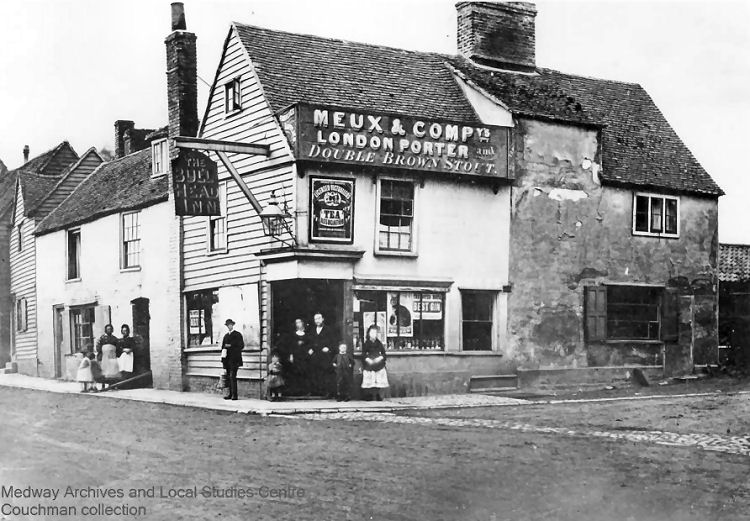
Above photo 1870, by permission of
http://www.kenthistoryforum.co.uk. This original building was
demolished around about 1873 and replaced by another building that went
under the name of the "Mid Kent Hotel" but changed back to the "Bull"
again in 1946. |
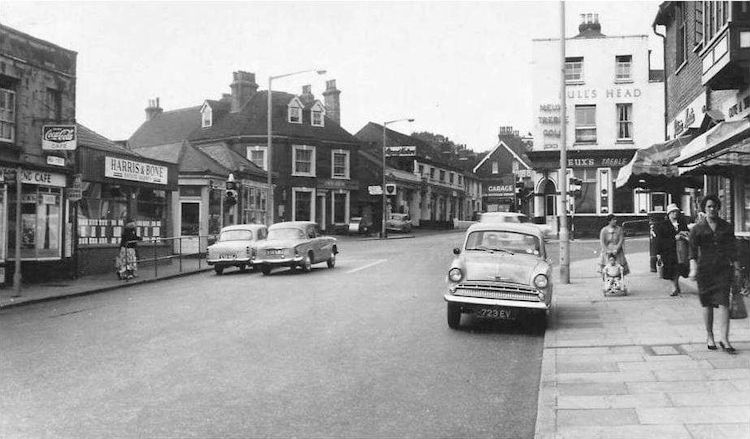
Above photo, 1960. |
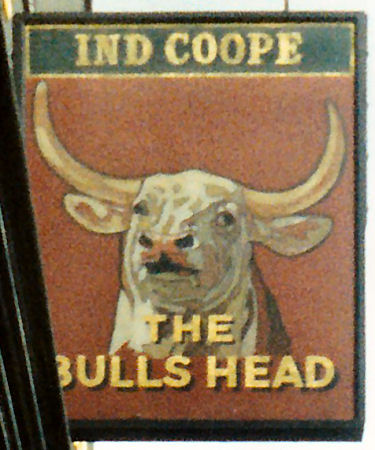
Above sign 1990.
With thanks from Brian Curtis
www.innsignsociety.com. |
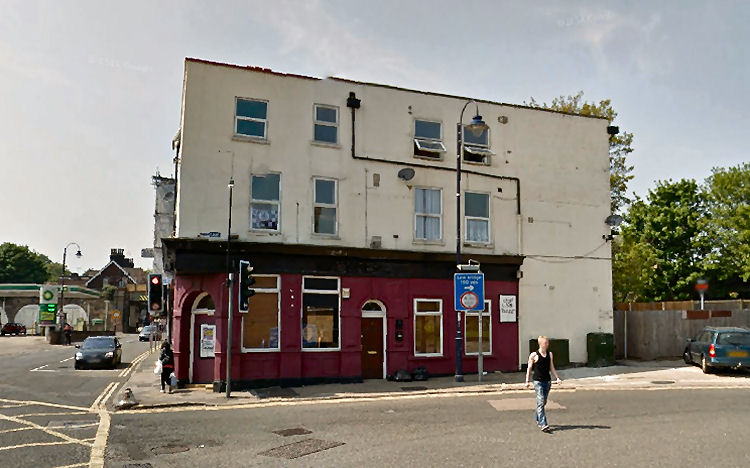
Above image from Google, May 2012. |
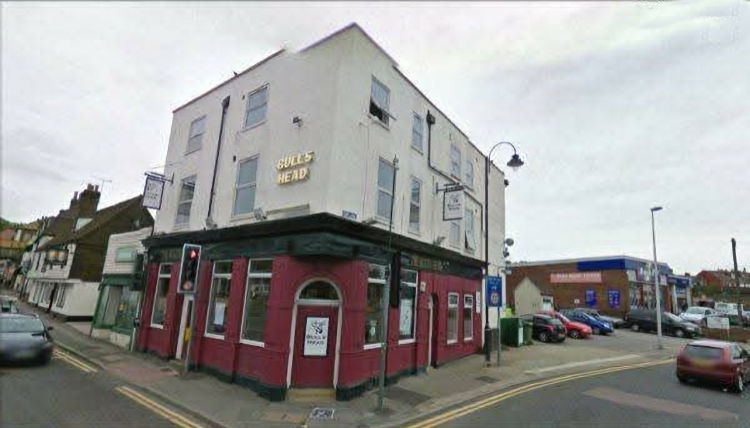
Above photo, date unknown. |
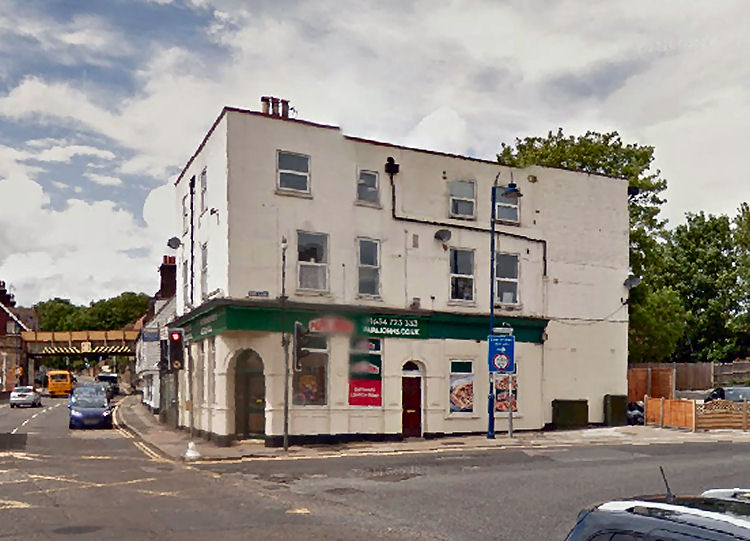
Above image from Google, May 2014. |
In 1869-70 the pub was part of a consortium who were advertising their
goods of selling tea in response to grocers' selling beer and wine. (Click
for further details.)
Originally built in 1844 on the junction of Strood High Street and Gun
Lane, this was demolished in 1873 to be rebuilt as the "Mid
Kent" and that was later renamed as the "Bull."
http://www.kenthistoryforum.co.uk states that the original pub dated
1870 approx in the top photo was called the "Mid Kent Hotel" for a short
time. In actual fact Couchman's notes state:- "Mid Kent Hotel" (formerly
1844-1873 and again from 1946. The "Bull's Head Hotel") no. 2 London Road"
which I have confirmed as correct referring to Kellys and the census
returns. So it was the "Mid Kent Hotel" for 73 years.
The original was Bull Head Inn (no 's' so probably more grammatically
correct,) although Pigot's Directory of 1828 seems to have got the 's' back
again.
|
Kentish Weekly Post or Canterbury Journal 21 June 1822.
Lieutenant William Hopwood, on the half-pay of the Army, aged 35 years,
died suddenly in the street a short distance from the "Bull's Head," in
Strood, on Thursday, and was taken to the Workhouse. It appears he had
left his home, in King-street, Troy Town, in the morning, in apparent
health, for the purpose of taking a walk, and signified his intention of
returning with something for dinner. The deceased was subject to fits.
|
|
From
http://www.medwaymemories.co.uk From the Times, 21 January 1837.
How one pauper died: starving in Strood.
Premature death, disease, starvation, poverty. Contrary to the many
rosy tales of a better life in the past, not all was good. The lives of
many Medway people in the 19th century were tough and dull. In some
cases they were heart-wrenchingly appalling.
Take this inquest report, which I found in The Times newspaper of 21
January, 1837. It is a tragic tale of a trader with connections among
the highest in the land who fell on times. How, we shall never know, for
he took his secret to a pauper's grave. The narrative style of the
report cannot disguise the awful facts. Here was a man who, at the
height of the Industrial Revolution, starved to death in Strood.
The inquest, by Rochester coroner Mr Patten, was held in the
boardroom of the North Aylesford Union workhouse, Strood. The dead man
was Thomas Burton, said to be aged about 65.
First to give evidence was Charles Dean, watchman for the parish of
Strood. “On Sunday night last, about half-past 11 o'clock, I was told by
a coachman of one of the Dover coaches that a person was lying in the
road, and was in danger being run over,” he said.
“I went up Strood Hill and met [Burton] coming down. He staggered in
his walk, and I thought he was intoxicated. I led him part of the way
down the hill. I asked turn where he was going; he said, to Strood; he
had come from Cobham.”
THOMAS BURTON WAS FIRST TAKEN TO THE BULL'S HEAD
The watchman then left him, but later found Burton lying in the road
again, so he and a colleague took him to the stables of the nearby
"Bull's Head," where they made him warm in the straw.
Burton's condition, however, was deteriorating and James Vine,
relieving officer of the union workhouse, was called. At first, Vine
said, he thought Burton was drunk, but soon changed his mind. This man
was terribly ill and he agreed to move him into the workhouse.
A medical man also attended. Robert Rogers — his role is unclear, but
he appears to have been a doctor's assistant — told the inquest: “I gave
directions that he was to be put into a warm bed, and to have a pint of
strong beef tea, and a tablespoonful of brandy every two hours, and not
to be put into a warm bath, or anything done which was likely to exhaust
him.”
Vine added: “I rang up … and procured the workhouse chair.” (In these
pre-telephone days, Vine must have meant that he rang a bell and issued
orders). “He was then removed to the workhouse, where every attention
was paid to him.”
A wash – but why on earth didn't they feed him?
But it was not enough, as an inmate, Susannah Hayler, explained. She
said: “Early on Monday morning last the deceased was brought. He was in
a very filthy state and I was employed to wash him. I used warm water. I
had washed his face and neck, and while washing his arms he died. He did
not speak at all.”
Joshua Hunt, master of the workhouse, added: “We placed him by the
fire in the hall, and I was ordered to get him some brandy-and-water and
some gruel; in the meantime he was being washed, and died in about half
an hour after his admission. There was no money found on his person.”
A pocket-book, however, was found in his hat. It contained “various
memoranda of the addresses of some of the nobility, and other persons of
high rank, to whom the deceased had applied for pecuniary assistance”.
Among the papers was a card for Thomas Burton, timber merchant, some
pawnbrokers' tickets, pledged in London, an account of timber cut on an
estate in 1787, and a letter from Lord Cornwallis: “For the last time,”
it said, “you may call upon Messrs Hoare's [presumably his lordship's
legal representatives] for a sovereign.”
Another envelope, although found without letter, came from the Earl
of Jersey. So this man indeed had connections in high places. But he
still starved to death.
The union's medical officer, William Stephenson, spelt out the
dreadful conclusion after conducting a post-mortem examination: “On
opening the chest I found the heart, lungs and every other viscera of
the chest perfectly healthy — indeed unusually so for a person of the
deceased's age.
“The stomach was distended with air, but perfectly empty, there being
no particle of food in it, nor in the intestinal canal. I am of opinion
the deceased died from cold and starvation.”
Horrible, isn't it? |
|
Kent Herald, 6 February 1845.
Marriage.
Jan 27, at Strood, Mr. Isaac Pemble, butcher, of East Malling, to Miss Fanny
Trench, of the "Bull's Head Inn," Strood.
|
|
Maidstone Telegraph. 5 June 1869.
Robbery by a Youth.
Henry Wilson, a respectably dressed youth, was placed in the dock on a
charge of stealing three wheels, two springs, and an axle tree, part of
a perambulator, the property of Mr. Henry Tranah, landlord, of the
"Bulls Head Inn," Strood, on Wednesday, the 20th inst.
The prisoner's father appeared in court, and evidently felt his son's
condition deeply, as he had resided in the locality for the last 30
years, and bore a most respectable character.
Mrs. Hannah Tranah, wife of the prosecutor, said she saw the three
wheels, two springs, and axle tree produce, safe in the backyard of her
husband's premises on the previous Sunday or Monday. On Wednesday
morning she missed them. They were worth about 15s.
P.C. Fishlock, said he went to the prisoner's father's premises, Gun
Lane, Strood, on Wednesday evening last, and found the wheels, springs,
and axle tree produce, fresh painted. On the prisoner being called,
witness asked him where he had got them from, and he said he bought of
Mr. Young, a turner. Witness said he should take him to Mr. Young's, to
see if his statement was correct, and the prisoner then acknowledged
that he had taken the property from Mr. Tranah's.
The prisoner pleaded guilty.
Mr. Colyer, by whom the prisoner had been employed, said he never knew
anything dishonest against him before, but he was frequently troublesome
in regard to matters of work.
The Magistrate sentenced the prisoner to one calendar month's hard
labour at the house of correction at Maidstone, the Mayor expressing a
hope that this would be a caution to the boy for the future.
|
I am informed that the pub closed in 2009, following a rather chequered
history when it kept shutting and opening again. Following its final closure
it suffered one of those unexplained fires which nearly completely destroyed
the building.
LICENSEE LIST
FREEMAN Richard 1828-32+
 
TRANAH Arthur 1851+ (age 68 in 1851 ) )
TRANAH Mary 1858+
TRANAH Henry 1861-71+ (age 38 in 1871 ) )
GILES Harold 1955+
https://pubwiki.co.uk/BullsHead.shtml
http://www.closedpubs.co.uk/bullshead.html
 From the Pigot's Directory 1828-29 From the Pigot's Directory 1828-29
 From the Pigot's Directory 1832-33-34 From the Pigot's Directory 1832-33-34
 Census Census
|





